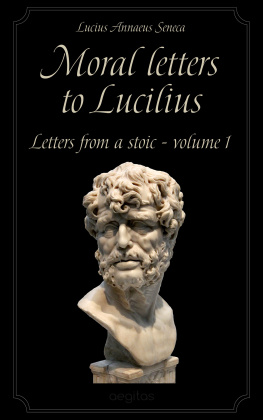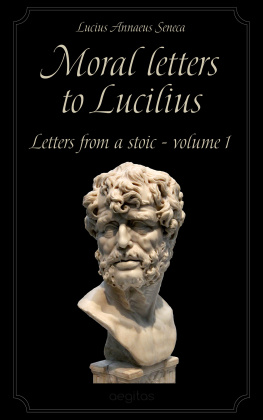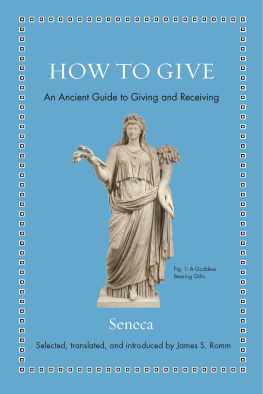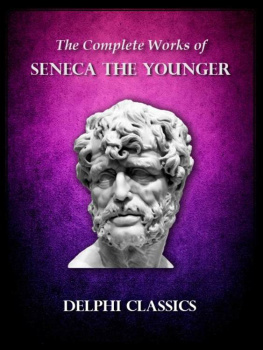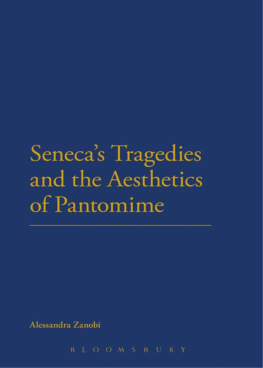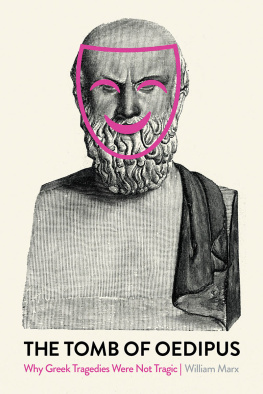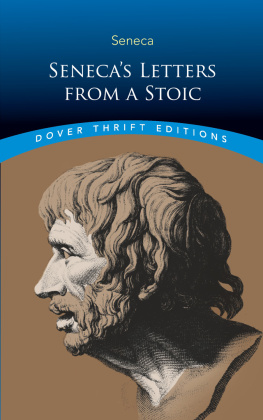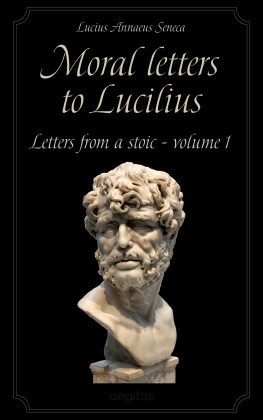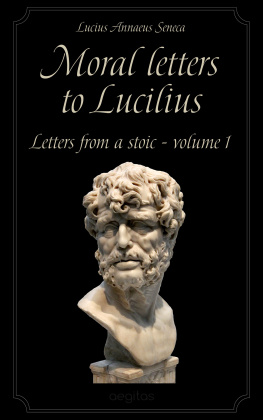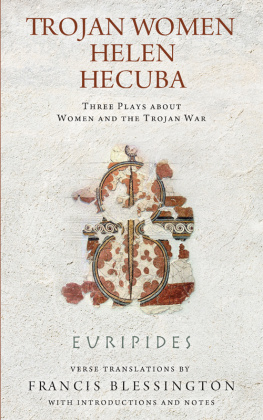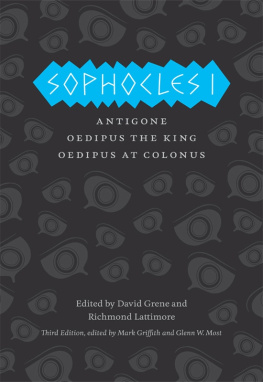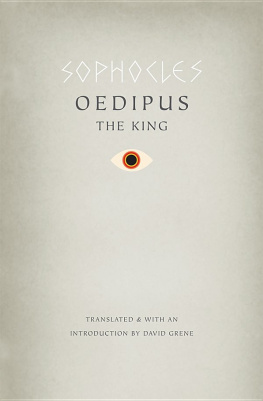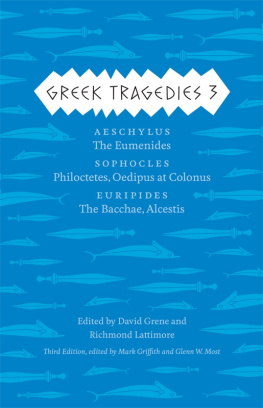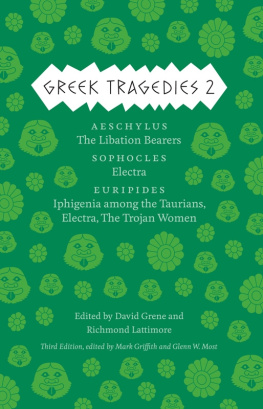Seneca - Four Tragedies and Octavia
Here you can read online Seneca - Four Tragedies and Octavia full text of the book (entire story) in english for free. Download pdf and epub, get meaning, cover and reviews about this ebook. year: 1966, publisher: Penguin Classics, genre: Detective and thriller. Description of the work, (preface) as well as reviews are available. Best literature library LitArk.com created for fans of good reading and offers a wide selection of genres:
Romance novel
Science fiction
Adventure
Detective
Science
History
Home and family
Prose
Art
Politics
Computer
Non-fiction
Religion
Business
Children
Humor
Choose a favorite category and find really read worthwhile books. Enjoy immersion in the world of imagination, feel the emotions of the characters or learn something new for yourself, make an fascinating discovery.
- Book:Four Tragedies and Octavia
- Author:
- Publisher:Penguin Classics
- Genre:
- Year:1966
- Rating:3 / 5
- Favourites:Add to favourites
- Your mark:
- 60
- 1
- 2
- 3
- 4
- 5
Four Tragedies and Octavia: summary, description and annotation
We offer to read an annotation, description, summary or preface (depends on what the author of the book "Four Tragedies and Octavia" wrote himself). If you haven't found the necessary information about the book — write in the comments, we will try to find it.
Seneca: author's other books
Who wrote Four Tragedies and Octavia? Find out the surname, the name of the author of the book and a list of all author's works by series.
Four Tragedies and Octavia — read online for free the complete book (whole text) full work
Below is the text of the book, divided by pages. System saving the place of the last page read, allows you to conveniently read the book "Four Tragedies and Octavia" online for free, without having to search again every time where you left off. Put a bookmark, and you can go to the page where you finished reading at any time.
Font size:
Interval:
Bookmark:

He was forced to retire into private life at one point because of the suspicions of the emperor Caligula. He returned on the accession of Claudius, but was exiled in A.D. 41 to Corsica, accused of adultery with Claudius niece. He wrote several works during the eight years in Corsica, including De Ira. He was recalled to Rome in A.D. 48 to act as tutor to the future emperor Nero, and became his principal civil adviser when he took power.
The first five years of the reign were peaceful and moderate, for which much credit must be given to Seneca. However the feud between the emperor and his mother, Agrippina, weakened his position and he asked to retire in A.D. 62. Nero and Seneca parted on seemingly amicable terms, but the various political conspiracies which followed implicated Seneca, though probably on very flimsy evidence, so that his death was ordered in A.D. 65. E. F. F.
WATLING was educated at Christs Hospital and University College, Oxford. His translations of Greek and Roman plays for the Penguin Classics include the seven plays of Sophocles, nine plays of Plautus, and this selection of the tragedies of Seneca. He died in 1990. SENECA
Penguin Books Ltd, Registered Offices: 80 Strand, London WC2R ORL, England
www.penguin.com
First published 1966
Copyright E.
F Watling, 1966 All rights reserved
The terms for performance of these translations may be obtained from the Society of Authors, 84 Drayton Gardens, London sw10 9SD to whom all applications for permission should be made
Except in the United States of America, this book is sold subject to the condition that it shall not, by way of trade or otherwise, be lent, re-sold, hired out, or otherwise circulated without the publishers prior consent in any form of binding or cover other than that in which it is published and without a similar condition including this condition being imposed on the subsequent purchaser
ISBN-13: 978-0-140-44174-1
The extant prose works pronounced the verdict from which few readers would dissent: There is in Seneca much with which one can agree, much even to admire; but his work requires selection; one could wish that he had done the selecting himself. Of the tragedies, with which we are here primarily concerned, the literary fate has been a peculiar one. Their reputation in the authors own lifetime, or immediately afterwards, can only be guessed, in the absence of any evidence of their actually having been performed; but at least their preservation is a reasonable ground for assuming them to have commanded some respect. Among scholars of the last two centuries, few have done anything but condemn the Senecan tragedies as horrible examples of literary and dramatic incompetence, travesties of the noble Greek drama, the last wretched remnants of declining Roman taste. The following extract from Schlegels lectures on drama (published in English in 1815) is representative of the view which all but excluded Seneca the tragedian from the serious consideration of classical students: The state of constant outrage in which Rome was kept by a series of blood-thirsty tyrants led to similar outrages upon nature in rhetoric and poetry [the Senecan tragedies] are beyond all description bombastic and frigid, utterly devoid of nature in character and action, full of the most revolting violations of propriety, and so barren of all theatrical effect, that I verily believe they were never meant to leave the schools of the rhetoricians for the stage. With the old Tragedies, those highest of the creations of Grecian poetical genius, these have nothing in common but the name, the exterior form, and the mythological matter: and yet they set themselves up beside them in the evident intention of surpassing them, in which attempt they come off like a hollow hyperbole contrasted with a most heartfelt truth.
Every common-place of tragedy is worried out to the last gasp; all is phrase, among which even the simplest is forced and stilted. An utter poverty of mind is tricked out with wit and acuteness. Their persons are neither ideal nor real men, but misshapen giants of puppets; and the wire that sets them a-going is at one time an unnatural heroism, at another a passion alike unnatural, which no atrocity of guilt can appal. By this and similar pronouncements the modern student will easily have been brought to the conclusion that to read the Senecan tragedies in the original language is an unrewarding task, and to read them in translation,
Next pageFont size:
Interval:
Bookmark:
Similar books «Four Tragedies and Octavia»
Look at similar books to Four Tragedies and Octavia. We have selected literature similar in name and meaning in the hope of providing readers with more options to find new, interesting, not yet read works.
Discussion, reviews of the book Four Tragedies and Octavia and just readers' own opinions. Leave your comments, write what you think about the work, its meaning or the main characters. Specify what exactly you liked and what you didn't like, and why you think so.


